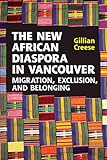The New African Diaspora in Vancouver : Migration, Exclusion and Belonging / Gillian Creese.
Material type: TextPublisher: Toronto : University of Toronto Press, [2016]Copyright date: ©2011Description: 1 online resource (288 p.)Content type:
TextPublisher: Toronto : University of Toronto Press, [2016]Copyright date: ©2011Description: 1 online resource (288 p.)Content type: - 9781442611597
- 9781442695184
- 305.896/071133 23
- F1089.5.V22 C74 2011eb
- online - DeGruyter
| Item type | Current library | Call number | URL | Status | Notes | Barcode | |
|---|---|---|---|---|---|---|---|
 eBook
eBook
|
Biblioteca "Angelicum" Pont. Univ. S.Tommaso d'Aquino Nuvola online | online - DeGruyter (Browse shelf(Opens below)) | Online access | Not for loan (Accesso limitato) | Accesso per gli utenti autorizzati / Access for authorized users | (dgr)9781442695184 |
Frontmatter -- Contents -- Acknowledgments -- Introduction: Migration, Diaspora Spaces, and ‘Canadianness’ -- 1. A New African Diaspora -- 2. Erasing Linguistic Capital -- 3. Downward Mobility, Class Dislocation, and Labour Market Barriers -- 4. Reproducing Difference at Work -- 5. Gender, Families, and Transitions -- 6. Identity and Spaces of Belonging -- 7. Practices of Belonging: Building the African Community in Vancouver -- Notes -- References -- Index
restricted access online access with authorization star
http://purl.org/coar/access_right/c_16ec
The New African Diaspora in Vancouver documents the experiences of immigrants from countries in sub-Saharan Africa on Canada's west coast. Despite their individual national origins, many adopt new identities as ‘African’ and are actively engaged in creating a new, place-based ‘African community.’ In this study, Gillian Creese analyzes interviews with sixty-one women and men from twenty-one African countries to document the gendered and racialized processes of community-building that occur in the contexts of marginalization and exclusion as they exist in Vancouver.Creese reveals that the routine discounting of previous education by potential employers, the demeaning of African accents and bodies by society at large, cultural pressures to reshape gender relations and parenting practices, and the absence of extended families often contribute to downward mobility for immigrants. The New African Diaspora in Vancouver maps out how African immigrants negotiate these multiple dimensions of local exclusion while at the same time creating new spaces of belonging and emerging collective identity.
Mode of access: Internet via World Wide Web.
In English.
Description based on online resource; title from PDF title page (publisher's Web site, viewed 01. Dez 2023)


